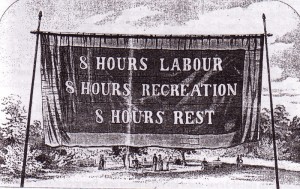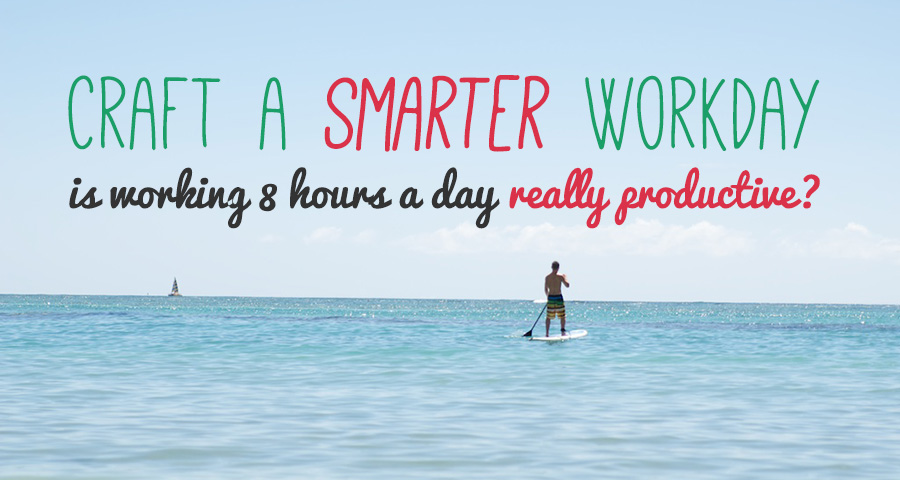I’d like to start by saying that the point of my argument in this article might not apply to some professions 🙂
How many hours a day do you work?
I’m assuming around 8.
Now, how many of those hours do you actually get real work done?
I’m willing to bet it’s much less than you think.
When I started working for myself in 2012, I realized that filling an entire 8 hour workday was surprisingly hard. Not because I didn’t have enough work to fill up the hours of the day, but because after working for about 6 hours, I’d get pretty much everything done that I wanted to complete for the day. I was no longer “in the zone”, and for the rest of the day I’d simply not have the drive to start something new, and ultimately waste time on Facebook or YouTube.
Eventually, I realized that I simply wasn’t productive when trying to work the traditional 8 hours a day, 40 hours a week.
The Origins of the 8-Hour Workday
 During the Industrial Revolution, many companies were trying to maximize their output by keeping their factories running as many hours as possible. This required workers to labour upwards of 18 hours a day, 6 days a week. They were paid awful wages, and often had to send their children to work in the factories as well just so they could get by. It was an all around bad situation. It wasn’t until the early 19th century, a brave British lad named Robert Owen suggested the day be split up into thirds: 8 hours labour, 8 hours recreation, 8 hours rest. His campaign wasn’t very successful, and progress was slow until around 1914 when the Ford Motor Company cut the standard work day to 8 hours, and doubled workers’ pay in the process. Everyone thought Ford was crazy until they were shocked with the realization that Ford’s company’s productivity shot through the roof and the company’s profit margins nearly doubled in only 2 years. Needless to say, many companies started implementing the 8-Hour Workday after that. Then in 1937, the 8-Hour Workday was standardized in the USA and regulated by the federal government.
During the Industrial Revolution, many companies were trying to maximize their output by keeping their factories running as many hours as possible. This required workers to labour upwards of 18 hours a day, 6 days a week. They were paid awful wages, and often had to send their children to work in the factories as well just so they could get by. It was an all around bad situation. It wasn’t until the early 19th century, a brave British lad named Robert Owen suggested the day be split up into thirds: 8 hours labour, 8 hours recreation, 8 hours rest. His campaign wasn’t very successful, and progress was slow until around 1914 when the Ford Motor Company cut the standard work day to 8 hours, and doubled workers’ pay in the process. Everyone thought Ford was crazy until they were shocked with the realization that Ford’s company’s productivity shot through the roof and the company’s profit margins nearly doubled in only 2 years. Needless to say, many companies started implementing the 8-Hour Workday after that. Then in 1937, the 8-Hour Workday was standardized in the USA and regulated by the federal government.
So there you have it. The 8-Hour Workday was actually a really good thing, and a very welcome change in society at the time.
But we’re no longer in an industrial revolution, so does the 8 hour day really equate productivity in our age of the “connection revolution“?
To some, it might seem unconventional to challenge the 8 hour day, or perhaps you might think I’m just trying to avoid working. But get this: I take my work very seriously — my family lives on a single income, so the work I get done directly affects our livelihood. So believe me when I say, I don’t slack off. On the flip side, I am grateful to be alive and do my best to live everyday to the fullest, so I aim to spend the hours of the day, and days of the week when I’m least productive with my family, enjoying the “fruits of my labour”, so to speak.
Maximize Output When You’re Most Productive
For me, the reality is I’m really only productive in the mornings and early afternoon, Monday to Thursday. And since I’ve realized, and accepted, the hours of the day I’m most productive (8am – 2pm), and the days of the week I’m most productive (Monday – Thursday), I actually get more work done than I ever did when I worked a full 8 hours a day, 40 hours a week.
Why? Because during those hours, I maximize my output by getting in the zone, focusing, working smart, and getting stuff DONE.
The best part? I’ve freed up a handful of hours every week that allow me to do things like:
- Be with my family
- Go for a bike ride
- Take the afternoon off to go Stand Up Paddleboarding
- Plant a fruit & vegetable garden
- Take Friday off and have a long weekend
Listen, my point here isn’t “work from home, or tough luck” because I understand that not every profession can accommodate a desire to just clock out after lunch time. What I am trying to say is, working 9am – 5pm, Monday to Friday, doesn’t necessarily equate productivity. If you have control over the hours you work, great. If not, it’s likely you do have some control over how you structure your workday. In either case, I’m suggesting structuring the tasks you need to complete in a workday around the times you are most productive, or “in the zone”. Sure, teachers can’t just walk out of English class because they don’t feel productive, however, there are a whole bunch of other things teachers do outside of the classroom — like grading papers. If you can understand the times you are most productive, then you can try and grade your papers within that timeframe. Whatever it is you do, whether you’re a songwriter, scientist, or even a student, I bet you can craft a smarter workday by structuring your most important tasks around your most productive times — even if you have to work 8 hours.
I challenge you to find out when you’re most productive
You can use an application called RescueTime (affiliate link) which sits in the background and monitors your computer usage and gives you weekly reports that tell how productive you are during certain hours, and what you spend most of your time doing. This way, you can begin to craft a smarter workday, where you spend your productive hours maximizing your output, and your non-productive hours doing the things you truly love doing (or at least taking a break). If you work from home, you can use this time to do what it is you wanted to do when you started working from home in the first place.
I’m only (really) productive for 120 hours in a single month, which works out to roughly 30 hours a week. During those hours, I make sure to get my most important work done.
Are you sitting at your desk 160+ hours a month, getting only 120 hours of work done? I’m challenging you to see if that’s the case. And if so, put the wheels in motion to craft a smarter workday. If you work from home, you have the perfect environment, and no excuse to immediately apply this challenge. If you work at an office (and must work a full 8 hours), you can do the same and simply maximize your daily output by structuring your most important tasks around your “in the zone” times.
With that, I’ll leave you with a quote from funny man, Jim Carrey:
“You can fail at what you don’t want, so you might as well take a chance on doing what you love.” (watch the video clip here)
